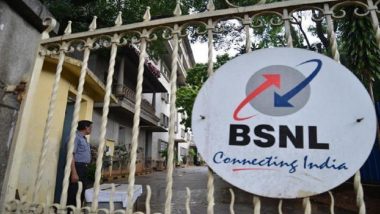New Delhi, March 13: The government on Tuesday granted Rs 1,000 crore to Bharat Sanchar Nigam Limited (BSNL) and Mahanagar Telephone Nigam Limited (MTNL) to help them clear their February wage bills. A senior official of the Department of Telecom (DoT) said BSNL will clear about Rs 850 crore dues of its employees before Holi (March 21). MTNL was given Rs 171 crore on Monday and instructed to pay salaries by Wednesday. IANS had on Tuesday reported about Telecom Minister Manoj Sinha's meeting with Finance Minister Arun Jaitley to seek over Rs 1,000 crore for the two telecom PSUs. The meeting was also attended by Telecom Secretary Aruna Sundararajan and MTNL CMD P.K. Purwar.
Due to stiff competition in a low-tariff market and crippled by lack of services due to no 4G spectrum, a huge work force of 1.76 lakh and without Delhi and Mumbai as operational bases, BSNL's profitability has suffered heavily in recent years. It's losses widened to Rs 7,992 crore in 2017-18. According to financial data shared by the Telecom Minister in the Lok Sabha, the company posted a loss of Rs 4,793 crore in 2016-17. BSNL Faces Financial Crisis, Fails to Pay February Salary to Its 1.76 Lakh Employees.
MTNL too has been on the decline. Its Q3FY19 losses widened to Rs 833 crore. The government has been footing the bill for monthly salaries of its 23,000 employees since November 2018. While BSNL's annual wage bill is Rs 15,000 crore, which is 85 per cent of its revenue, MTNL's yearly wage bill is Rs 2,500 crore, 95 per cent of its revenue. In contrast, the salary bills of private operators are less than 10 per cent of their revenues.
MTNL has a debt of around Rs 19,000 crore. BSNL has the lowest debt of Rs 14,000 crore among all the telecom operators. MTNL also has a negative market share, while BSNL's holds 11 per cent share in mobile market, mostly comprising 3G and 2G services. The DoT is preparing a revival plan for both the state-run telcos.
Both have sought permissions to monetise their land assets as well as implement the Gujarat model of voluntary retirement scheme (VRS) for employees. Under the Gujarat model, an amount equivalent to 35-day salary for each completed year of service and 25-day salary for each year of service left till retirement is offered.
Implementing the VRS scheme will have a revenue impact of Rs 6,365 crore and Rs 2,120 crore at BSNL and MTNL, respectively. Both the companies have also sought spectrum for 4G services through equity infusion from the government.
They have also been ailing because of high revenue-to-debt ratio due to the large number of government employees the DoT transferred to them at the time of their formation. It is estimated that 16,000 MTNL employees and 50 per cent staff of BSNL will retire in 5-6 years.
(The above story first appeared on LatestLY on Mar 13, 2019 07:13 PM IST. For more news and updates on politics, world, sports, entertainment and lifestyle, log on to our website latestly.com).













 Quickly
Quickly




















